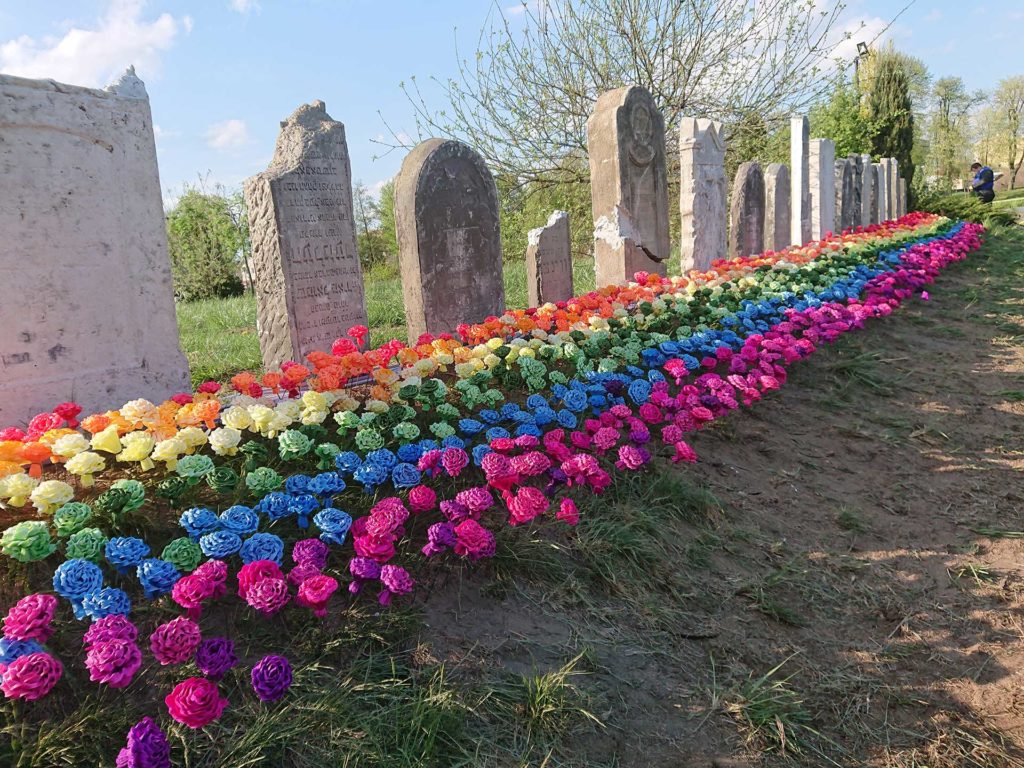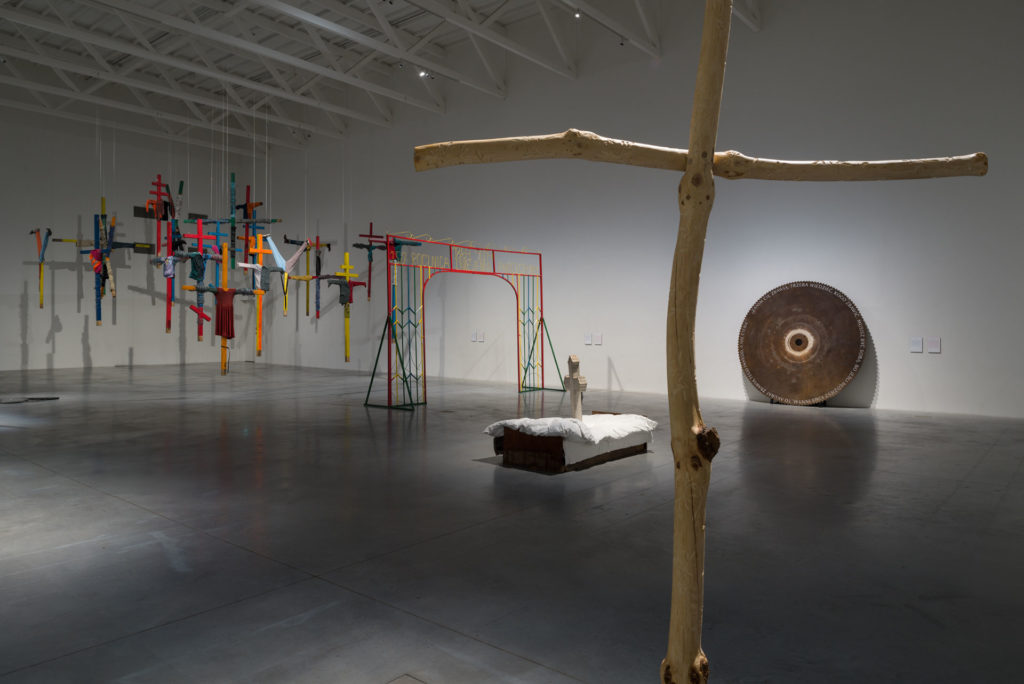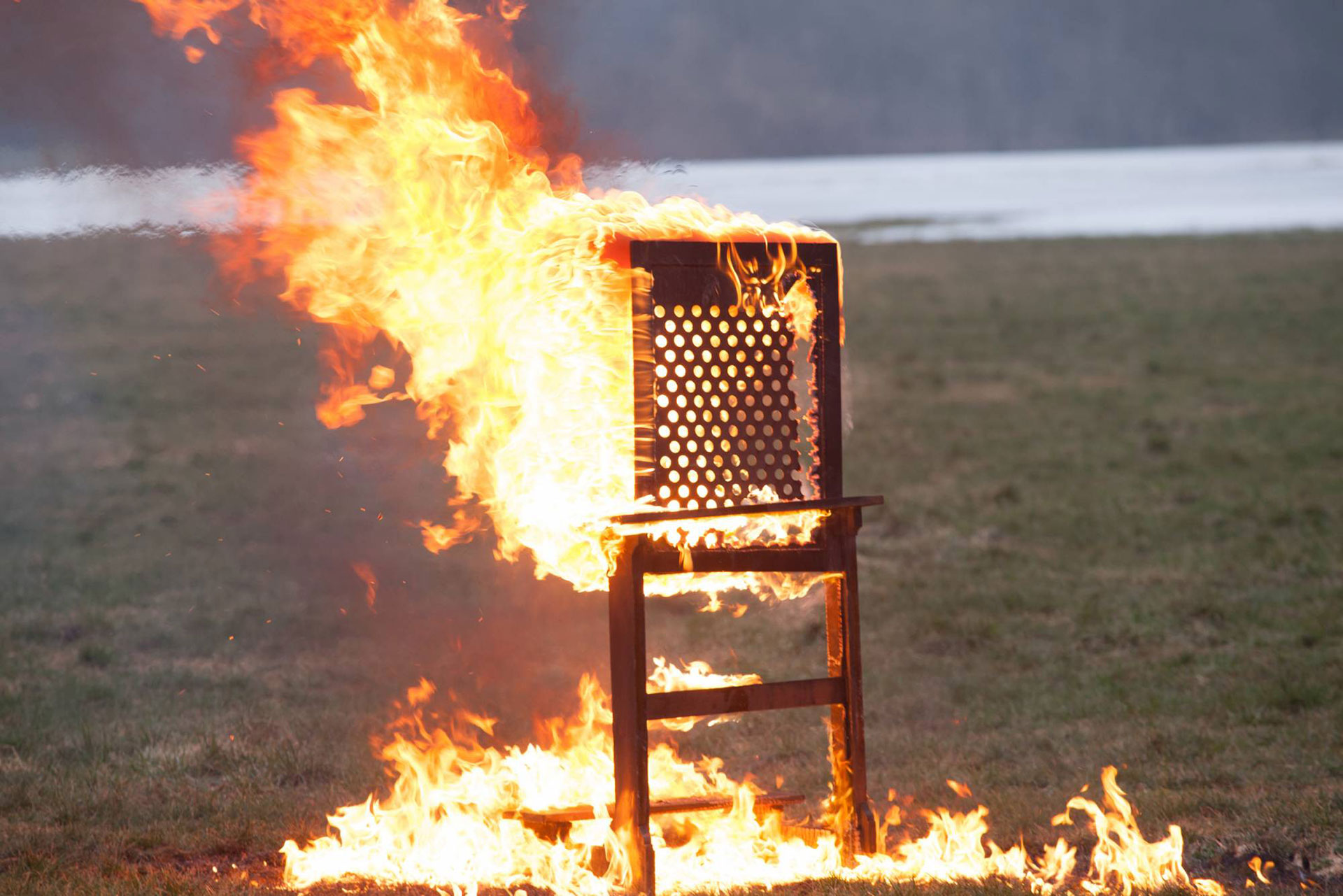Mike Urbaniak in conversation with Daniel Rycharski.
MU: Are the fears you’re facing today greater than the fears you dealt with in previous years?
DR: The answer to this question is much more complicated than some would like it to be. And this is precisely why I spend most of the time in the countryside – in the village of Sierpiec and Kurówek that are located in the north of the Mazovia region.
On the one hand, the attitude of local people towards LGBT issues has changed for the better. To be honest, in here I have experienced homophobic discrimination only once, though, of course, the so-called ‘soft homophobia’ is still present. Today, I’m under the impression that the more the politicians of Law and Justice party are repressive towards non-heterosexuals, the more gestures of solidarity I personally experience.
MU: Maybe it’s because you are a famous artist?
DR: Of course, this fact surely has influence on the way people react to me. Most of my LGBT friends that live here – few ones that still haven’t left for Warsaw – are still in the closet and can painfully experience the growing atmosphere of homophobia.
MU: Or maybe, paradoxically, it will bring about a positive change? I am under the impression that even those who used to have a rather ambivalent attitude towards the LGBT community, now feel that the bounds of decency have been pushed.
DR: You’re right. Even my father who lives in the countryside and is a mechanic has noticed this hateful media campaign. He has never been a homophobe, but has always been rather lukewarm towards LGBT issues.
MU: So in the long term, will this hate campaign have good results?
DR: In my opinion, yes. I think it’s time to show more actively than ever that we are normal people. We are just like everyone else. However, we must not forget about those particularly affected by the current homophobic hate campaign.
MU: And you expect that “The Family Care” will help them?
DR: “The Family Care” is a project I’m preparing together with farmers and Catholic families from Sierpiec and neighbouring villages. I’m looking for farmers who are struggling to maintain their family farms, as well as big-city homosexuals that have found themselves in a different kind of crysis. They are all invited to participate in our project.
MU: Where exactly are they invited to?
DR: To a farmhouse located near Sierpiec.They will be spending their nights there. During the day, they will be working and relaxing on other farms. The whole thing will be financed by the Museum of Modern art in Warsaw as a part of the Warsaw Under Construction Festival.
MU: You were inspired by the book Futility and Hope. Psychiatric Family Care in an Anthropological Perspective written by dr Andrzej Perzanowski, a researcher from the Institute of Ethnology and Cultural Anthropology of the University of Warsaw.
DR: Andrzej Perzanowski described a therapeutic practice that was initiated in the 1930s’ in Choroszcza, a town near Białystok where a psychiatric hospital exists until today. This experimental practice involved putting the chronically ill patients into the care of local peasant families. Families received money and the patients could get away from the institutional confinement of a barred psychiatric ward. A family-like bond formed between the patients and the families.
MU: What was happening in Choroszcza is extremely interesting, just like your project in general. However, for me the very fact that the LGBT people appear in the context of psychiatry, one in which they appeared for years, is a red flag. “Rychtarski wants to cure homosexuality”, I pondered.
DR: Of course it’s not about curing homosexuality because it’s not an illness.I want to re-activate the practice described by Perzanowski to cure homophobia, a serious illness of our society. Homophobia makes the members of the LGBT community depressed and leads them to addictions. Contempt and lack of acceptance lead to anxiety. It is a perfect time to object to say no to hate and to reach out to people, regardless of what is being publish in the press.
MU: What are the LGBT people expected to get out of this therapeutic practice? Is it supposed to bring them out of the state of ‘futility’ defined as rejection, lack of hope for a better life or a happier existence in the society? Is it supposed to bring them ‘hope’ that Perzanowski defines as emancipation?
DR: I think that we need to start breaking stereotypes and trying to find ‘the cure’. So far, there are four families that are willing to take care of the LGBT people. We are still looking for four more. Together with Tomek Fudala, Natalia Sielewicz and Szymon Maliborski – the curators of the Museum of Modern Art – we are also looking for the participants representing the LGBT community.
MU: Which criteria should the participants meet? Is being a victim of homophobia one of them?
DR: Past experience of physical or verbal abuse is not a requirement. After all, homophobia has many faces and everyone can experience it in a different way.
MU: You expect to find as many LGBT participants as there are families?
DR: Yes, we are looking for eight of them. It is going to be a one-week-long holiday in the Masovian countryside. As I mentioned earlier on, participants will spend their nights in a beautifully located farmhouse, and the days at farms around Sierpiec. At the beginning, the farmers will explain and demonstrate to the participants their daily activities. Later, they will engage their guests in their work. There will no exhausting fieldwork, unless of course somebody agrees on that. The stay at the countryside is expected to be a form of relax. I chose the beginning of August as a starting date on purpose. After all, it’s the time for harvesting and participating in harvest festivals. There is much less work to be done, while the weather is still good. I’ve also planned some bonfires, canoe trips, and evening meetings with guests – firemen or local artists. We want all participants to have a chance to get to know each other.
MU: An idyllic picture of the Polish countryside.
DR: Maybe it’s idyllic?Maybe it’s just true? Maybe it’s the Polish farmers that will cure our homophobia? The fact that “The Family Care” will be carried out in the countryside is very important to me. Big-city elites have accused people living in the countryside of voting for Law and Justice party in the act of revenge for years of contempt and exclusion, and thus unleashing hell for the whole society. The perversity of this project lies in the fact that support for the LGBT people unexpectedly comes from the countryside, making it a positive setting for this story .
MU: By showing that people living in the countryside are not always backwards and superstitious?
DR: The countryside is a much more complex place than many people think. It’s true that many people who live there vote for Law and Justice party. There are people like that in my family. But it’s not that they vote for them because they like what that party says about the LGBT community. Many people vote for them out of economic, not homophobic reasons.

MU: The problem is that one can’t have one without another. Did you have any problems with finding Catholic families for the project? I can imagine that the local priests can’t have liked it.
DR: I can only answer this partly, as I am still in the process of looking for families. The Church plays a rather ambiguous part. I sometimes get to know priests that are supportive to my actions. It happened with my project “The Island”. The participants were students of a Catholic high school. The aim of the project was to commemorate the local Jewish community and to test the attitude of locals towards non-heteronormative persons. I also met some open-minded priests in the group ‘Faith and Rainbow’ that brings together LGBT christians. However, the contact with them was never official.
MU: They were afraid?
DR: Afraid of their superiors. When it comes to LGBT issues, the views of many priests are less conservative than the views of the bishops. It’s partly because many of them are gay themselves.

MU: And yet you left ‘Faith and Rainbow’.
DR: I never really left it. I just realized that my artistic-spiritual actions addressed to the Church weren’t really effective. They brought no results, no change for the better.
MU: You irritated the church because you didn’t attack it from an anti-clerical perspective. You attacked it from the perspective of a catholic individual trying to remind the Church about its own teachings. It was like that with your project “The Board”. You were standing with next to St. Hyacinth’s Church in Warsaw. The board featured the Code of Canon law of the Catholic Church that forbids discriminating against LGBT people. You presenting the Canon law of the Church next to a church!
DR: I was chased away by the friars. Actually, I’ve chased away quite often. It also happened when, together with ‘Faith and Rainbow’, I wanted to organize the Way of the Cross in the intention of victims of homophobia. I even prepared a special ‘cross’. Each station was supposed to be accompanied by a text read out loud by Halina Bortnowska, Jan Turnau…
MU: The so-called ‘open-minded catholics’.
DR: The so-called ‘open church’ is yet another thing I was disappointed with. Very soon it turned out to be not really open. Besides, how can you go to church and allow its officials to treat LGBT people the way they do? Dietrich Bonhoeffer, a Lutheran pastor whose theology influenced my spirituality, believed that you could not consider yourself Christian and support Hitler at the same time. One contradicts the other. And in Polish church nothing contradicts. You can consider yourself Catholic and still be hateful towards others. This is why I distanced myself from the so-called ‘open church’. I haven’t become a protestant. I consider myself a non-denominational christian.
MU: And some members of the ‘open Church’ suspect you have bad intentions.
DR: Yes, I experienced it last year with the exhibition “Fears” held at the Museum of Modern Art. The ‘progressive catholic media’ had a problem with writing about my art though I’ve never created anything offensive. I create my art and my social-artistic activities in order to start a dialogue. However, I feel that dialogue is something more and more difficult to hold.
MU: Warsaw-based gays don’t really fit in the Polish countryside.
DR: Anything can happen. The willingness of the farmers to participate in the project proves it. They are mostly Catholics living in the countryside, and yet they decided to invite LGBT people. They don’t want to pass their judgment, they want to reach out. I want to look for things that unite us, rather than those that divide us. I want to show that dialogue and respect are are possible.
MU: President Duda’s words about “LGBT not being people” helped “The Family Care” in any way?
DR: Our project was to be launched a bit later, but the president’s statement made us start it sooner. Comments made by the president and other politicians of Law and Justice party made me act faster. I decided to show that there are people in Poland who, despite their conservative views, do not approve of the hate speech. And here we are – a group of farmers from the most traditional part of Masovia reach out to LGBT people to express their solidarity and readiness to help.
MU: “The Family Care” is financed by the Museum of Modern Art. The financing includes paying farmers for inviting LGBT people. Can it still be called selfless help then?
DR: It’s good you asked about it. Financing is a crucial part of this project. Andrzej Perzanowski also pointed out this aspect. He argued that remuneration (farmers participating in the project will receive 300 zlotys per day) doesn’t exclude a genuine need to help and real emotions. Providing care is a job like any other and it should be rewarded according to its value. Thanks to this kind of job, our society can become better.
At this point, it’s worth to ask why we pay people so little for taking care of others. In his book Bullshit Jobs, the American anthropologist David Graeber asks why some professions are well-paid, while others – including being a caregiver – are not. Through “The Family Help” I’d also like to show the real value of professions that include providing care. In our case it will be farmers turned caregivers.
MU: Just like me, you’ve been involved in LGBT issues for years. You must have become quite thick-skinned by now. Did the dehumanizing statements made by Polish politicians hurt you? Because they surely hurt me.
DR: Of course it hurt me. It all even made me imagine myself standing by the window and jumping out of it. When I had my exhibition in Nice six months ago, the French invited me to stay there. They wanted to rescue me because the whole world is fully aware of what can happen to LGBT people in Poland. They were shocked and worried that something could happen to me. And it all came back after hearing president Duda’s words.
MU: And yet you haven’t moved to the French Riviera but decided to stay in Kurówek.
DR: You know what, I’m a really family-oriented person. I want to be close to my family, and to places I come from. Not only I’m not moving anywhere, but I even decided that in autumn I will start building a house in here.





